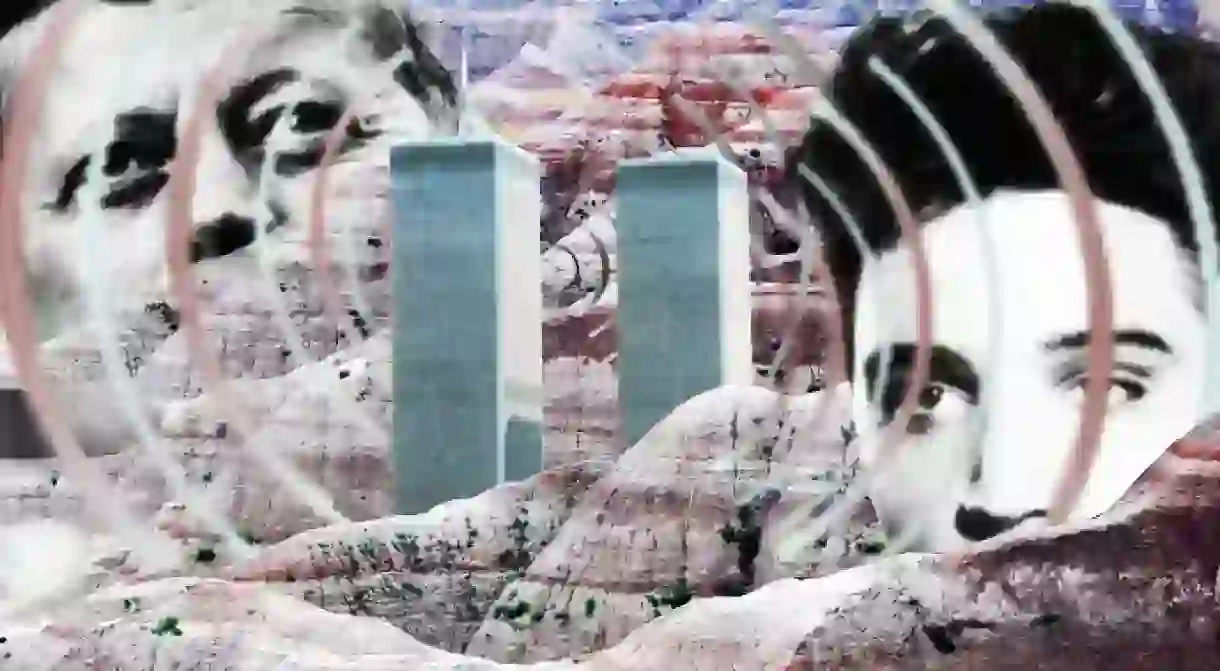In 'Shadowbahn' Novelist Steve Erickson Warns Us to Save America from Itself

The award-winning author imagines a USA where American music is disappearing and the Twin Towers have mysteriously returned.

Shadowbahn, Steve Erickson’s first novel in five years, begins with a charged premise: it is twenty years after 9/11 and the Twin Towers have suddenly reappeared, intact, in the alien geography of the South Dakota Badlands. First noticed by a passing trucker, news of their return becomes a full-blown media sensation and public spectacle, drawing hundreds to come out and see them. Unbeknownst to the crowds or camera crews, Jesse Presley, the stillborn brother of Elvis, has woken up as an adult on the 93rd floor of the South Tower. His attempt to escape finds him lost within other parallel versions of reality. While this is happening, the Towers are doing something to American music, broadcasting it like radio towers, while causing it to disappear everywhere else. Only two siblings, Parker and Zema, are seemingly left unaffected. They embark upon a road trip from a California consumed by a Dust Bowl toward a dust-free Michigan— crossing an America now split by Federal and Disunion states—to see their mother. They may, in fact, be carrying the last record of American music.
The beginning of Steve Erickson’s Shadowbahn is worth summarizing in part for the sorcery of its plot, and for a demonstration of how Erickson excels at fictionalizing America’s descent into confusion and fracture. Written before Trump’s ascent to power, Shadowbahn is frightening for its political prescience, but ultimately redemptive in its vision: a portrait of America, mired in a cultural confusion not unlike our own, that even its history is threatening to abandon. But the characters that inhabit this novel aren’t oblivious to this fact—a bumper sticker on the trucker’s big rig fender puts the sentiment of the novel best: SAVE AMERICA FROM ITSELF.
At the heart of Shadowbahn is the narrative of Parker and Zema. He is in his early twenties and a white Californian native; she is in her mid-teens and a black immigrant from Addis Ababa. Because of their contrasting skin tones, motel clerks don’t believe that they’re siblings. Parker has trouble understanding how this life, particularly his, ended up this way: At night, unable to sleep, he recalls communicating with his girlfriend in a mental institution via the titles of songs on a playlist and texts “to unconsciousness” in order to fall asleep. During the day, they listen to playlists and mixes assembled and noted by their dead father. When their car briefly breaks down in Disunion territory, they encounter a astrophysist-turned-gas attendant who helps them back on the road and toward the Shadowbahn, an elusive highway that is political neutral and that will take them, not to their mother, but to the Twin Towers. As they approach their destination, people gather at their windows, wanting to know why they hear music coming from the car.
It turns out that the music isn’t coming from the car, but from Zema who emanates songs just like the Towers do. According to Erickson, though he reticent to suggest why, Zema’s body has always quietly emitted music. “I’m not a radio,” she constantly repeats to her brother. Zema and her radio body are both a character and characteristic of Erickson’s previous novel These Dreams of You, a story that figures largely around her adoption into the family by Parker’s late father, a novelist turned pirate radio named DJ Alexander Nordhoc. While not a direct sequel, the Parker and Zema exist within Erickson’s growing cosmology set within the broken heart of the USA. But they’re not the only characters with a story to tell about it.

Music also drives the narrative of Jesse Presley, the other main protagonist of the book, but rather than being drawn by the sound of music, he instead ends up in the company of those who perform it. By switching Elvis with Jesse, Erickson uses to the stillborn twin’s voyage into a parallel realities to explore the massive impact that his brother’s absence would have had on US culture: black music fails to be appropriated by white culture; JFK loses the Democratic nomination to Adlai Stevenson in 1960 and now exists as an obscure senator and Warhol groupee; then there’s The Beatles (here the floundering Silver Beatles) who barely survive on the German club circuit before deciding to split up. As Doctor Winston O’Boogie (a clever reference to John Lennon) bemoans: “[if] Billy O’Shakespeare comes along a century earlier, same bloke, all the same talent…, and what’s it get him? The Black Death or smack in the middle of the War of the bleedin’ Roses.”
Shadowbahn at first appears to be indicative of Erickson’s long obsession with forking paths and subjective realities — Jesse has to live through this alternate history to get back to the Towers where he will eventually encounter Parker and Zema. But here, history is treated as a loop, one that only the appearance of the Towers can break. While this might seem like Erickson is trying to gaslight the reader, he is instead more interested in showing how a single event can be experienced in so many ways. Along with Parker, Zema, and Jesse, it is also the nameless people drawn to see the Towers that Erickson wants us to pay attention to, and through them, showing us how music can register different emotional content for two different people (everyone hears a different song emitting from the Towers), and how the reappearance of the Twin Towers, which evokes a collective response from the nation, would be a collection of individual experiences. Alongside Trump’s admonishment of “fake news” and Kellyanne Conway’s use of “alternative facts” Erickson’s Shadowbahn has essentially presented us with a substitute America.
SHADOWBAHN
by Steve Erickson
Published by Blue Rider Press
Hardcover | 320 pp. | $27.00













